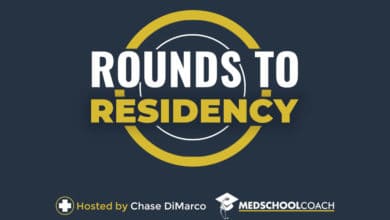Chase DiMarco talks to Brenda Thompson, a Graduate Medical Education (GME) expert with over ten years of experience in residency-related accreditation, education, and other similar topics. They discuss assessment criteria for residency evaluations, professional maturity during residency, and the adoption of behavioral assessments in the hospital setting.
- [01:24] Brenda Thompson’s Background and Roles in GME
- [03:45] Changing Medicine and Medical Education for the Better
- [06:24] The SWOT Analysis During Residency
- [08:31] Comparing the Six ACGME Requirements to the Core EPAs
- [10:15] Assessment Criteria for Residency Evaluations
- [14:45] Residency Orientation and Its Effects on Students
- [18:25] The Adoption of Behavioral Assessment in the Hospital Setting
- [19:40] Positive Attitude and Professionalism During Residency
- [23:20] How to Exhibit Professional Maturity During Residency
SWOT Analysis During Residency
The SWOT analysis is a strategic planning technique used to define a resident’s Strengths, Weaknesses, Opportunities, and Threats in the competitive landscape. The analysis breaks down key metrics that determine performance and the overall success for a resident during clinical rotations. Unfortunately, most medical students don’t know the SWOT analysis exists. And since sometimes residency directors don’t fill out evaluation forms, students automatically assume that evaluations are not a part of their residency programs. So, as a resident or a medical student, always be mindful of how you behave and present yourself during rotations. Brenda explains that residency directors are tasked with evaluating and reporting on residency programs. Thus, you must ensure that you understand the hospital’s code of conduct and the milestones expected from you.
Residency Orientation and Its Effect on Students
Residents are always eager to jump right in and start taking care of patients. However, before you can take care of your first patient, most hospitals hold an orientation week. The orientation week is a chance to be introduced to hospital staff, surroundings, culture, and practices. The idea behind it is to give residents a brief overview of what to expect and experience the daily operations in the hospital.
Brenda believes that a one-week orientation period is not enough to prepare students for the busy hospital schedules. She explains that every new year brings a different kind of medical student. Over the years, she has noticed that students are often less prepared for professionalism in the hospital setting. Hence, some students rarely uphold the professional standards demanded.
So, if you want a long, fulfilling career in medicine, Brenda believes that you must present yourself as a top professional. Further, the SWOT analysis determines how much you get paid as a practitioner. If patients and staff are impressed with your practice, you are more likely to earn more.
Positive Attitudes and Professionalism During Residency
Residency programs will drain you physically, mentally, and emotionally, regardless of what specialty you pursue. Sadly, most residents get sucked into the whirlpool of negativity while tackling the everyday ongoings of the hospital. Although you can’t control the events around you, Brenda believes you can control how you respond to them. Therefore, it would be best to arm yourself with a positive mindset that might make draining situations bearable.
She further explains that as a resident, you should not feel like an expert in anything. Always remember, you’re there to learn, and residency is all about making you a better physician. So, whenever a doctor provides feedback or positive criticism, be professional about it. This means taking criticism positively, reacting maturely, and developing listening skills.
Links and Resources
Brenda’s new book: Graduate Medical Education
Brenda’s Previous Episode on the Rounds to Residency Podcast
Sign up for a Free Coaching session with Chase DiMarco, sponsored by Prospective Doctor! You can also join the Med Mnemonist Mastermind FB Group today and learn more about study methods, memory techniques, and MORE! Do check out Read This Before Medical School. Like our FreeMedEd Facebook page and find our Medical Micro Course, Blog posts, and Podcasts at FreeMedEd.org! Feel free to Email any Questions or Comments.
